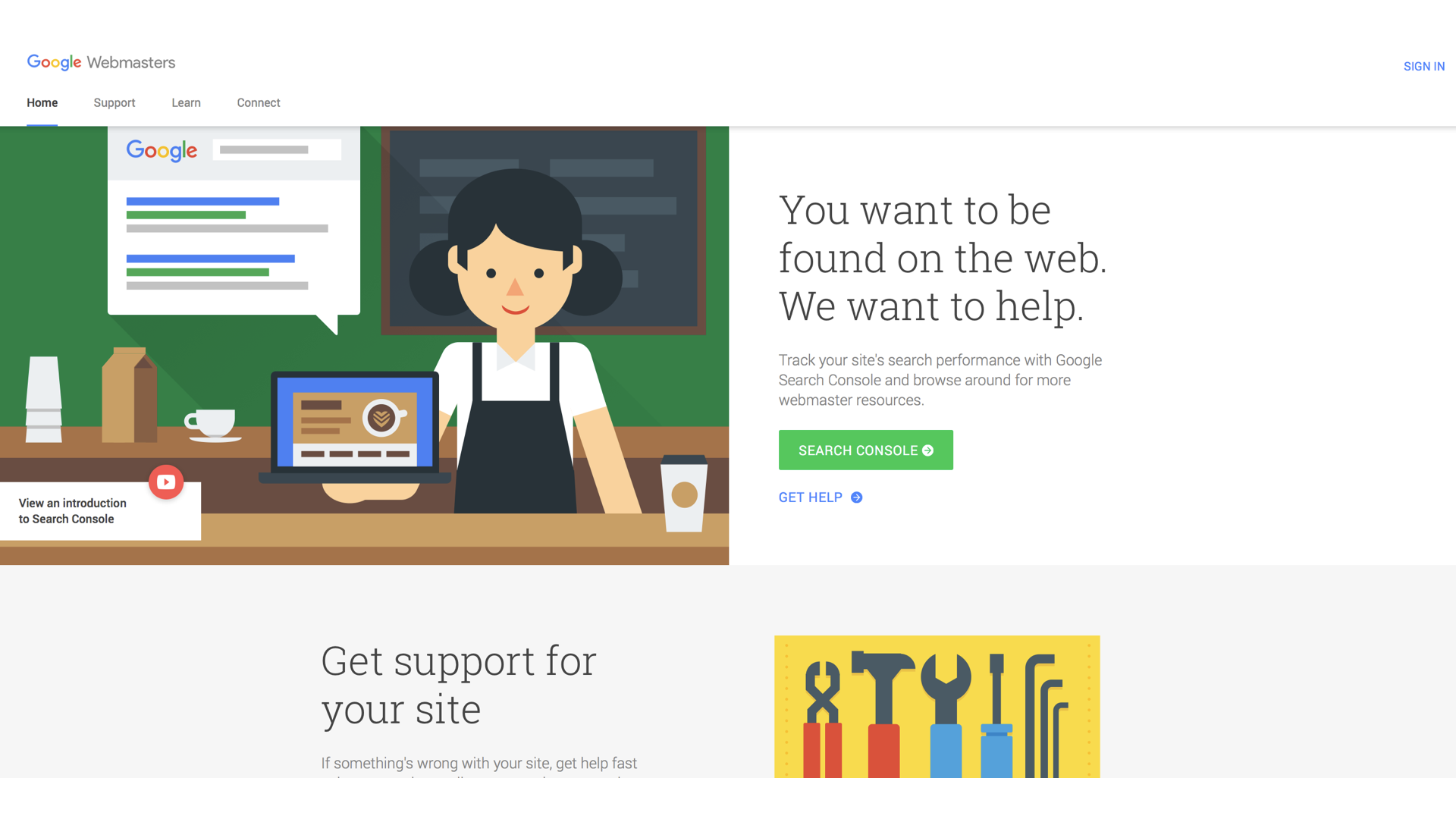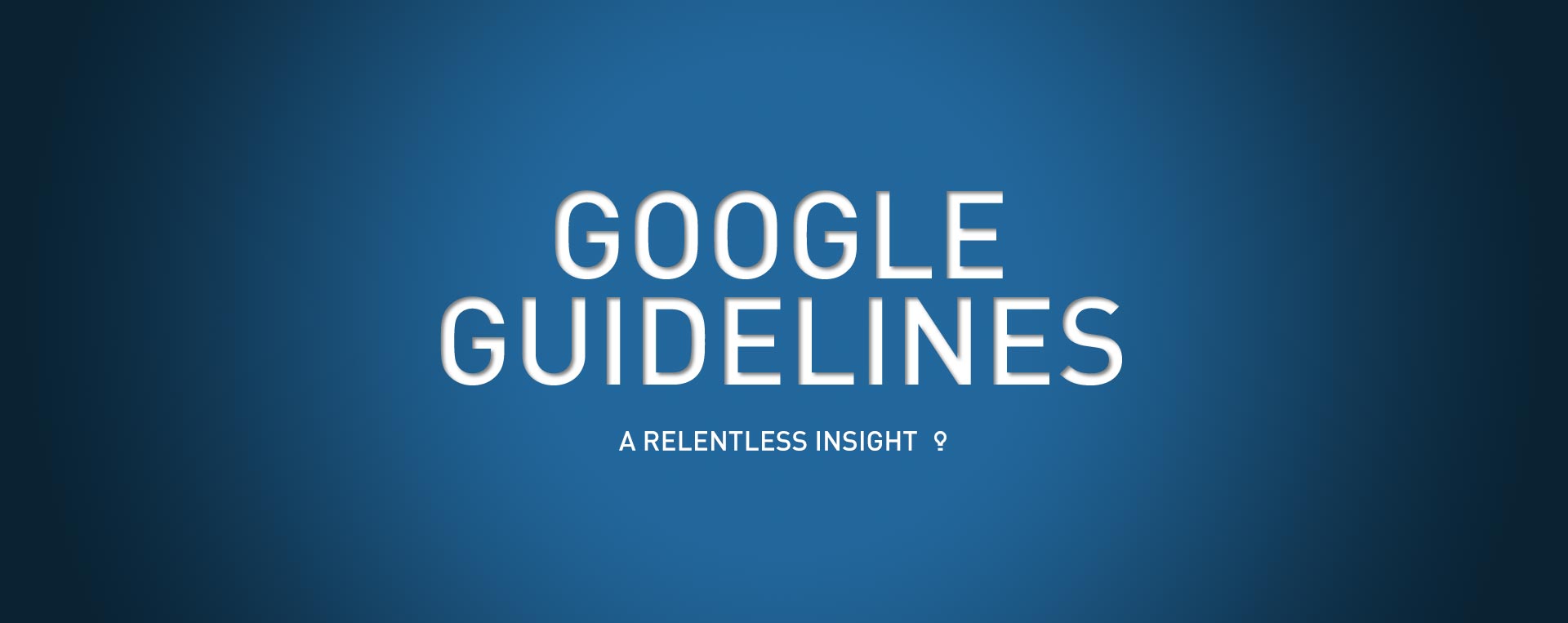Google Guidelines
Google provides all the information you need in order to rank in the search results, and they strongly encourage you to pay attention to their guidelines.
In the introduction paragraph for Google’s Guidelines, they recommend that you “pay very close attention to the Quality Guidelines…which outline some of the illicit practices that may lead to a site being removed entirely from the Google index or otherwise affected by an algorithmic or manual spam action.”

Basic Principles
Make pages primarily for users, not for search engines.
This is something we have always recommended to our clients, and still do to this day. If at any point, you start creating pages or content on your website, or start putting links on low quality websites to try to influence rankings, always ask yourself, “does this help my users in any way?”
If the answer is “no”, you should probably be spending your time doing something else. Trying to “game” the Google algorithm is pretty much impossible these days. Whatever trick you think you might have discovered to manipulate the search results, understand that everything has been done before and abuse of the algorithm will always catch up to you.
Don’t deceive your users.
Don’t do any sort of “bait and switch” tactics that are misleading and aim to manipulate Google users. Ask yourself if what you are doing is something you yourself would want to see in a business trying to market to you.
At a technical level, don’t do any form of cloaking or masking to try and show a version of your website to the search engines, and a separate version to your users.
Avoid tricks intended to improve search engine rankings. A good rule of thumb is whether you’d feel comfortable explaining what you’ve done to a website that competes with you, or to a Google employee. Another useful test is to ask, “Does this help my users? Would I do this if search engines didn’t exist?”
“Avoid tricks” is aimed squarely at SEO companies and their tactics. While Google generally has a good relationship with SEO as an industry, they only support it so far. In their own documentation Google says “Deciding to hire an SEO is a big decision that can potentially improve your site and save time, but you can also risk damage to your site and reputation.” (emphasis is ours)
Google acknowledges that SEO can improve your site, they don’t waste any time letting you know it could have the opposite effect and actually do more harm than good. Remember that no one can guarantee a #1 ranking on Google.
Think about what makes your website unique, valuable, or engaging. Make your website stand out from others in your field.
The best thing to do here is actual online competitive research in your field, take notes of what competitors are doing, and decide if you could do it better. And by better, we mean better within the guidelines of serving users needs, not the search engine. Focus on your customers, focus on your product and value, and the internet marketing tends to work itself out.
Help Google Find Your Pages
From Google: “Ensure that all pages on the site can be reached by a link from another findable page. The referring link should include either text or, for images, an alt attribute, that is relevant to the target page.”
This means you need to get links from other websites essentially. But this means that every page on your website should be able to be reached from another webpage, including pages on your own website. For more information on how Google crawls your website, you can read about it in one of our other articles.
Regarding links from other websites, Google is very clear on what they want and what they don’t want.
The following are examples of link schemes which can negatively impact a site’s ranking in search results:
- Buying or selling links that pass PageRank. This includes exchanging money for links, or posts that contain links; exchanging goods or services for links; or sending someone a “free” product in exchange for them writing about it and including a link
- Excessive link exchanges (“Link to me and I’ll link to you”) or partner pages exclusively for the sake of cross-linking
- Large-scale article marketing or guest posting campaigns with keyword-rich anchor text links
- Using automated programs or services to create links to your site
In addition to these methods, Google also warns against any link intended to manipulate the search rankings of a website:
Here are a few common examples of unnatural links that may violate Google guidelines:
- Text advertisements that pass PageRank
- Advertorials or native advertising where payment is received for articles that include links that pass PageRank
- Links with optimized anchor text in articles or press releases distributed on other sites.
- Low-quality directory or bookmark site links
- Keyword-rich, hidden or low-quality links embedded in widgets that are distributed across various sites
- Widely distributed links in the footers or templates of various sites
- Forum comments with optimized links in the post or signature, for example:
Thanks, that’s great info!
– Paul
paul’s pizza san diego pizza best pizza san diego
What Kind of Content Does Google Want?
Here Google is pretty clear as well. There are no tricks either, just common sense.
- Create a useful, information-rich site, and write pages that clearly and accurately describe your content.
- Think about the words users would type to find your pages, and make sure that your site actually includes those words within it.
Content marketing only works if you have something to say and you can commit to sharing that knowledge often. Commitment is the hardest part of a content marketing campaign. Content marketing can take time to get traction, with little results early on, but potentially big pay-offs later on. For more on content marketing please see our previous post here.
SEO is a viable marketing channel, but you have to remember you are in Google’s domain. They set the rules, have all the power, and can change their minds whenever they see fit. If marketing with Google is important to you, follow the rules and guidelines that Google lays out, or risk getting penalized and removed from Google.
Posted on: 10/20/2017
Posted by: Craig Hauptman – President & Founder
Related Insights:
Search Traffic: Paid vs. Organic – The Fundamental Differences and How to Leverage Each Type
Mobile Majority – Why a Mobile-First Approach is so Important
The AIDA Model – When to Use Specific Digital Ad Platforms Throughout the Sales Funnel
A/B Testing for Continual Improvements – Split Testing for Incremental Website Improvements
AI Chatbots & Search Engines – How AI Chatbots Will Impact Search Engines
















